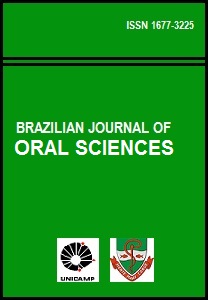Abstract
Rehabilitation of edentulous patients has been a constant concern in dentistry. Several studies have reported a reduction in the masticatory function in these patients. Osseointegrated implants have been used in order to obtain better masticatory efficiency, but more studies are needed to confirm these results. Aim: To evaluate the masticatory function of patients with conventional dentures and implant-supported dentures. Methods: A double-blinded controlled clinical study was conducted. The sample was composed of 60 patients divided into three groups: G1 with 20 patients with conventional upper (maxillary) and lower (mandibular) complete dentures, G2 with 20 patients with mandibular overdentures and upper (maxillary) complete dentures, and G3 with 20 patients with lower fixed implant-supported complete dentures (protocol). Objective data were collected through the masticatory efficiency test performed by the colorimetric method with the beads, in which capsules of a synthetic material enclosing fuchsine-containing granules were used. Results: A statistically significant difference was found for masticatory efficiency between groups G1 and G2 (pd”0.05) and between G1 and G3 (pd”0.05), and there was no statistically significant difference between G2 and G3 (pe”0.05). Conclusions: The results suggest that placement of osseointegrated implants in complete denture wearers improves their masticatory efficiency.The Brazilian Journal of Oral Sciences uses the Creative Commons license (CC), thus preserving the integrity of the articles in an open access environment.
Downloads
Download data is not yet available.

